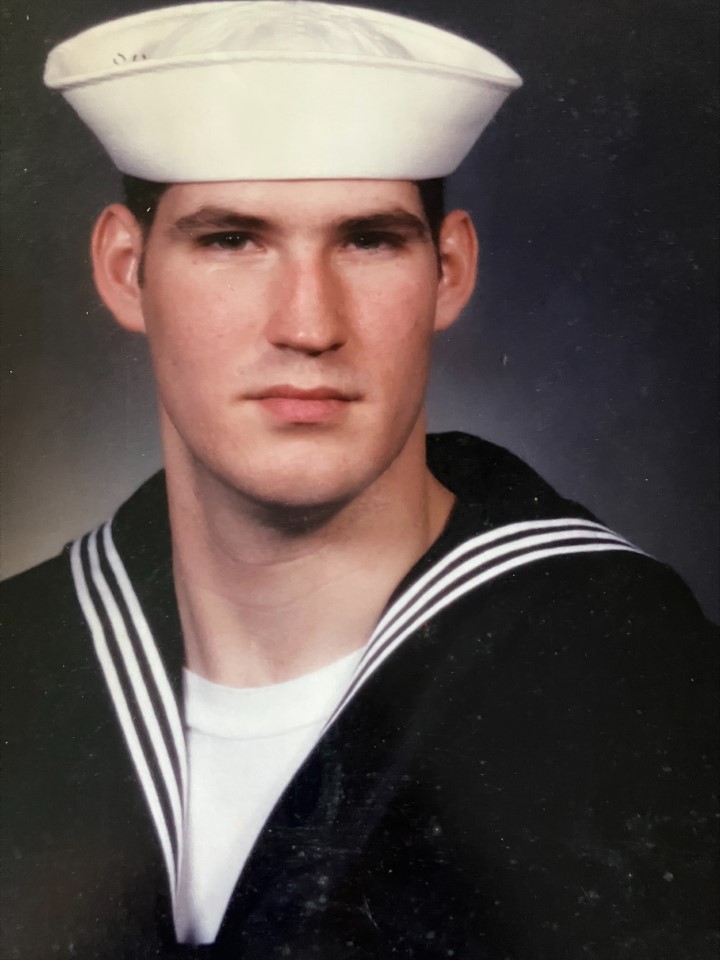‘Harvey Is a Great Example of Why Veterans Are Such Special People’
The way Harvey Huebotter, B.S.N., R.N., CEN, sees it, the U.S. Navy gave him what he needed to become the accomplished nurse he is today, while continuing his studies with plans to become a nurse practitioner.
“It’s hard to believe that I went from a high school dropout to two bachelor’s degrees, and I’m soon to have a master’s,” said Huebotter, an Emergency Department nurse at Texas Health Arlington Memorial Hospital. “I thank the military for giving me the maturity and drive to accomplish that.”

Blake Kretz, FACHE, hospital president, said, “We love our veterans at Texas Health Arlington Memorial Hospital. Harvey is a great example of why veterans are such special people. They bring both life experience and broad clinical expertise to our organization. As Veterans Day approaches, I want to thank them for their service.”
Huebotter had just turned 20 when he enlisted in 1997 in Baytown, Texas. By the time he left the Navy in 2006, he had nine years of varied healthcare experience, inspiration from physicians who “challenged me and asked me questions and made me think” and certification as an EMT.

My granddad was a Navy man; that was the main force that pushed me into the military,” he said. Before enlisting, he had earned his GED and had a couple of college credits in automotive school, but he was restless and didn’t want to live with his parents.
“I grew up poor and didn’t have educational opportunities, per se,” he said. “I figured I would become a paramedic, get out and have a job.”
He saw the world as a hospital corpsman on the USS Doyle from 1998 to 2000. The ship, which was later decommissioned, performed military exercises as it traveled from Florida to the U.S. and British Virgin Islands, passed through the Strait of Magellan in Chile, made stops in Peru, Ecuador and other countries, went through the Panama Canal and headed back to Florida.
Huebotter started his medical career as a hospital corpsman at Naval Hospital Jacksonville in Florida, then was transferred to a branch clinic in Mayport, Florida, where he had duties similar to those of a physician assistant.
Sept. 11 attacks
His plan was to serve for four years, but the Sept. 11 attacks in 2001 changed everything. Huebotter extended his enlistment contract to meet the needs of the military.
By early 2003, he was aboard the USS Tarawa in the Persian Gulf as part of a casualty receiving team, just before the Iraq War began. The team was made up of 16 physicians and 50 corpsmen, ready to treat victims.
Fortunately, the team wasn’t as busy as expected, so after four months they disembarked and waited in tents on a Kuwaiti naval base for an airplane to take them home. In the meantime, Huebotter and his team provided medical coverage for convoys into Kuwait City.
After he returned to the branch clinic in Mayport, Huebotter was certified in EMT basics and became the Emergency Medical Services coordinator.
His next orders were to go to Greece, but he fell in love with his now-wife, Katherine, and asked to go to Naval Medical Center Camp Lejeune in North Carolina to be closer to her. He was a nuclear medicine clerk there and worked with a physician who saw promise in Huebotter and urged him to go to medical school when he got out of the Navy.

He was honorably discharged from the Navy on June 29, 2006.
Huebotter earned a biology degree in 2012 and planned to go to medical school. He shifted to nursing instead and earned his Bachelor of Science in nursing from the University of Texas at Arlington. He came to Texas Health Arlington Memorial nine months ago, after working at the Dallas VA Medical Center and Methodist Charlton Medical Center Dallas.
He’s working part time now as he continues nurse practitioner classes and clinical rotations at the same time.
“I love nursing,” Huebotter said. “I’ve only been a nurse for about five years, but with my military time I’ve been working in medicine almost 20 years. With everything I’ve been through in the military, it’s helped me see the big picture of what’s going on with a patient, and so does my nurse practitioner training.”
Published November 8, 2022

